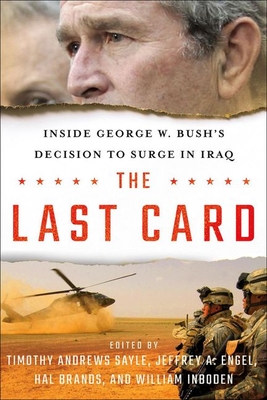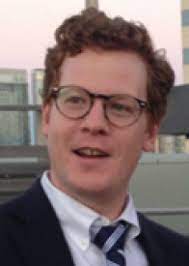

 Cornell University Press
Cornell University Press
The Last Card: Inside George W. Bush's Decision to Surge in Iraq


Key Metrics
- Timothy Andrews Sayle
- Cornell University Press
- Hardcover
- 9781501715181
- 9.2 X 8.2 X 1.2 inches
- 1.5 pounds
- History > Military - Iraq War (2003-2011)
- English
 Secure Transaction
Secure TransactionBook Description
This is the real story of how George W. Bush came to double-down on Iraq in the highest stakes gamble of his entire presidency. Drawing on extensive interviews with nearly thirty senior officials, including President Bush himself, The Last Card offers an unprecedented look into the process by which Bush overruled much of the military leadership and many of his trusted advisors, and authorized the deployment of roughly 30,000 additional troops to the warzone in a bid to save Iraq from collapse in 2007.
The adoption of a new counterinsurgency strategy and surge of new troops into Iraq altered the American posture in the Middle East for a decade to come. In The Last Card we have access to the deliberations among the decision-makers on Bush's national security team as they embarked on that course. In their own words, President George W. Bush, Vice President Dick Cheney, National Security Advisor Stephen Hadley, Secretary of State Condoleezza Rice, White House Chief of Staff Joshua Bolten, Secretary of Defense Robert Gates, and others, recount the debates and disputes that informed the process as President Bush weighed the historical lessons of Vietnam against the perceived strategic imperatives in the Middle East. For a president who had earlier vowed never to dictate military strategy to generals, the deliberations in the Oval Office and Situation Room in 2006 constituted a trying and fateful moment.
Even a president at war is bound by rules of consensus and limited by the risk of constitutional crisis. What is to be achieved in the warzone must also be possible in Washington, D.C. Bush risked losing public esteem and courted political ruin by refusing to disengage from the costly war in Iraq. The Last Card is a portrait of leadership--firm and daring if flawed--in the Bush White House.
The personal perspectives from men and women who served at the White House, Foggy Bottom, the Pentagon, and in Baghdad, are complemented by critical assessments written by leading scholars in the field of international security. Taken together, the candid interviews and probing essays are a first draft of the history of the surge and new chapter in the history of the American presidency.
Author Bio
Professor Sayle is a Senior Fellow of the Bill Graham Centre for Contemporary International History, an affiliate of the Centre for the Study of the United States, and an associate of the Center for Presidential History at Southern Methodist University. He is a Fellow of Trinity College and alumnus of Massey College.
Timothy Andrews Sayle is Assistant Professor of History and Director of the International Relations Program. He is the author of Enduring Alliance: A History of NATO and the Postwar Global Order (Cornell, 2019). He has co-edited two volumes: with Jeffrey A. Engel, Hal Brands, and William Inboden The Last Card: Inside George W. Bush’s Decision to Surge in Iraq (Cornell, 2019); and with Susan Colbourn, The Nuclear North: Histories of Canada in the Atomic Age (University of British Columbia Press, 2020).
His research on NATO, Canadian-American relations, and intelligence issues has been published in Canadian Military History, Cold War History, Intelligence & National Security, International Journal, International History Review, Historical Journal, International Politics, The Journal of Strategic Studies, and in several edited books.
Graduate and undergraduate students at the University of Toronto have worked with Professor Sayle to build Canada Declassified, a web repository of recently declassified archival records. This project has been supported by a SSHRC Insight Development Grant and a Connaught New Research Award. Professor Sayle is a project leader of the Canadian Foreign Intelligence History Project.
- Research Interests
- Modern global security
- post-1945 history of international relations and grand strategy
- nuclear history
- intelligence history
Source: University of Toronto Department of History
Videos
No Videos
Community reviews
Write a ReviewNo Community reviews